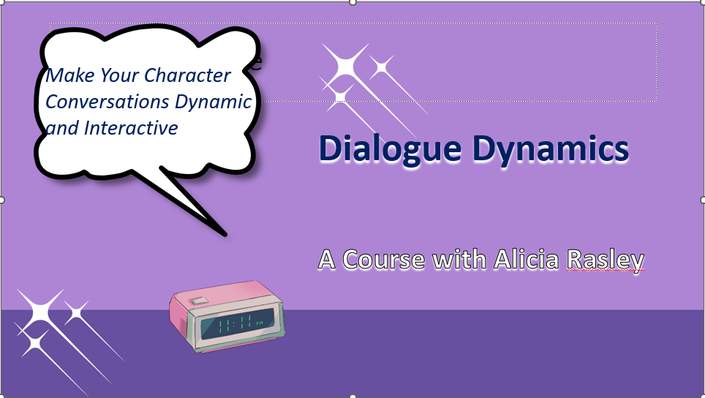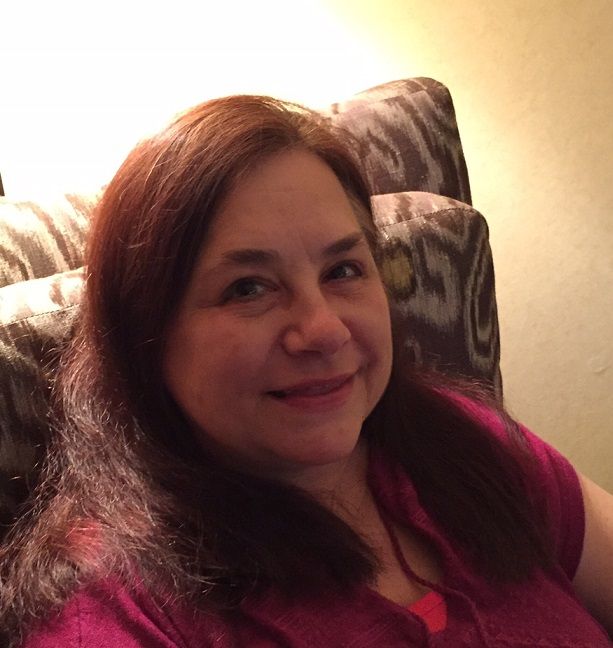
Dialogue Dynamics with Alicia Rasley
Character Action and Interaction in Conversation
Enroll in Course
Hello, writers!
In this course, we'll discuss the many ways we can use dialogue to energize and develop our stories and characters.
Always remember-- we have been dialoguing all our lives. If we speak and listen, we can write great dialogue. This course will help you capture your characters' personalities, conflicts, and relationships in their conversation-- and use those conversations to propel the plot to greater drama and dynamic action.

Your Instructor

Hi, I'm Alicia Rasley, and when it comes to writing stories, I've about done it all. You know that Frank Sinatra song? "I've been a puppet, a pauper, a pirate, a poet, a pawn and a king." Well, I've been a writer, a winner, an editor, a sinner, a leader, a reader, a professor and a pupil....
Okay, I can't think of any better alliteration or rhymes. You get the idea. With varying degrees of success and luck, I've experienced a lot in writing and teaching writing. And now I am sharing that hard-won wisdom with newer writers-- writers like you who might not want to spend twenty years in the school of hard knocks before writing a successful story. I attended that Hard Knocks University, and I have the blood-spattered diploma. You don't have to, because I'm going to help you learn in a few weeks the most important elements of crafting a good story: The structure that supports and develops the story-- the plot/character framework. The characters' journeys. The bold and vivid scene design. The dynamics of dialogue.
Of all those different roles, I think what taught me the most about the importance of story structure was the editing. I remember sitting at a desk surrounded by piles of manuscripts submitted for -- well, actually, the submissions were all electronic by then, so I was surrounded by piles of pixels. But these were pixels that added up to stories created with love and suffering by dedicated and determined writers.
As I read the pages, I could tell how much pain and joy went into writing these stories. Those writers had put their minds and hearts into their stories, struggling over every scene and character. And I wanted to help each and every one of them make those stories better.
But there I was, representing the publisher. My job, basically, was to reject-- to reject every submission except the very few who got it all right-- the plot, the characterization, the theme... the VOICE.
So often I had to write a rejection letter to authors, saying the plot was intriguing and the characters were interesting, but that the scenes were uninspired and the voice was generic.(I usually tried to make the tone nicer than that. :) The worst part was, when I told them the scenes and voice weren't good enough, I couldn't take the time to tell them how to add energy and individuality.
My job, sadly, was mostly to swiftly read a plot synopsis and first three chapters, and then write a kind note saying, "Sorry, this isn't the sort of story we're looking for." I might even add, meaning to be helpful, "You might consider working with an editor or critique group to help with your sentences and scenes."
I know... that wasn't much help. Editors will edit and critique groups will critique... but there's a long step between "this is boring" to "this is how to make it interesting." And I know many writers don't want their stories FIXED by someone else. They want to learn how to write and revise their story so that it matches their vision and sounds like their voice.
Now I'm a pretty experienced editor and critiquer. I have studied prose and poetry and fiction and drama, and I bring those analytical skills to editing manuscripts and teaching grammar and style. But what even I can't do is make the story sound like YOU.
What I can do is go through a manuscript and teach a writer strategies for analyzing what's there and how to get from there to what it should be-- how it should SOUND to be in your voice.
Wouldn't you know it... once I could add "bestseller" and "award-winner" to my name, other writers wanted to discuss plotting with me and to ask me questions. So I started a blog with my managing editor Theresa Stevens (nothing ever dies on the internet-- it's still there, long after we've both gone back to teaching and writing: www.edittorrent.blogspot.com) where we'd explore major writing questions ("how do I keep the middle of the story from sagging?") to minor editing issues (you should read our long-running rant stream about dangling participles!).
During this time, I was writing about writing for magazines and book publishers, and I gathered many of the articles on my Story Journey website. (Okay, it took awhile, as I had to figure out WordPress first. Okay, I still haven't figured out WordPress. But I did archive a lot of articles there! www.aliciarasley.com.) I started a new blog too, focused more on plotting than editing-- the Plot Blueprint blog- www.plotblueprint.com.
Enough bragging. Point is, you don't have to do what I did. You don't have to spent two decades writing and struggling and being rejected and studying and experimenting and learning from failure and success and spending big money on writing books and writing conferences. I've already done that. And I have gathered all my knowledge about scenes and prose and voice and can help you apply that to your very own scenes.
And with the magic of the internet, I can sit here in placid Indiana, and you can be wherever more interesting place you are, and we can work through your scenes together. It will be fun, and it will be fulfilling. I love helping other people with their stories (so much easier than writing my own <G>), and I'd love to explore with you.
What do you say? Would you like the benefit of my years of toil, blood, sweat, rejection, rejecting, success, failure, thinking, learning, teaching? Would you like to work with a "a writer, a winner, an editor, a sinner, a leader, a reader, a professor and a pupil"? Well, you're in the right place. Let's get going!
Course Curriculum
-
StartLesson 1- Introduction to Dialogue Dynamics (2:34)
-
StartLesson 2: Dialogue as Characterization Introduction (10:11)
-
StartLesson 3: Characters Speak from Their Backgrounds (8:48)
-
StartLesson 4: Character Think and Character Speak (7:46)
-
StartLesson 5: Conversation as Plot Action and Character Interaction (21:18)
-
StartLesson 6: Dialogue Mechanics
-
StartLesson 7: Quote Tags in Dialogue
-
StartLesson 8: And About Adverbs...
-
StartLesson 9: Dialogue Actions
-
StartLesson 10: Purposeful Dialogue (30:41)
-
StartLesson 11: Avoiding the Wooden
-
StartLesson 12: Interlock and Echo
-
StartLesson 13: Subtext in Dialogue (8:09)
-
StartLesson 14: Making the Fun of Dialogue in Big Scenes
-
StartLesson 15: Final Dialogue Tips
Frequently Asked Questions
I hope you are intrigued enough to join the Dialogue course! We can have some great conversations about your character conversations!

